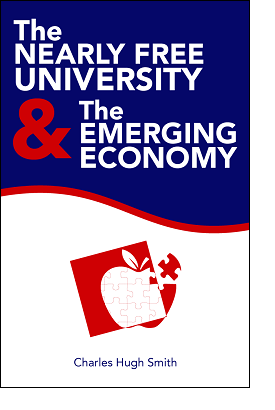A New Way of Defining Wealth
What if our commoditized, financialized definition of wealth reflects a staggering poverty of culture, spirit, wisdom, practicality and common sense?
The conventional definition of wealth is solely financial: ownership of universally valued money and assets. The assumption is that money can buy anything the owner desires: power, access, land, shelter, energy, transport and if not love, then a facsimile of caring.
The flaw in this reductionist definition is obvious: not everything of value can be purchased at any price--for example, health, once lost, cannot be purchased for $1 million, $10 million or even $100 million. A facsimile of friendship can be purchased (i.e. companions willing to trade fake friendliness for money), but true friendship cannot be bought at any price: its very nature renders friendship a non-commodity.
This explains the abundance of wealthy people who are miserable, lonely and phony to the core. Only commoditized goods and services can be bought with money or assets.
Given the limits of the conventional model of wealth, the question naturally arises: what if we defined wealth more by what cannot be bought rather than by what can be bought? Another way of making the distinction is to ask: what has been commoditized/globalized such that any person with money anywhere on the planet can buy it? What cannot be commoditized because it is intrinsically inaccessible to commodification?
We can start our inquiry with a series of questions:
1. What would be the impact on an individual's health if modern medicine/pharmaceuticals were no longer available? Put another way: how dependent is one's "good health" on commoditized interventions? How independent is an individual's health/vitality from commoditized medicine?
Health that is sufficiently vibrant that it has no need for commoditized medicine cannot be bought, and therefore it is a form of intrinsic (non-commodity) wealth.
2. Can a shipwrecked individual swim two miles through open ocean from a doomed ship/yacht to safety? Money has no value if there is no help that can be bought; the individual's only wealth in this situation (assuming they know how to swim) is their core physical strength and endurance--forms of wealth that cannot be substituted with money.
3. If Cicero was correct and "The man who has a garden and a library has everything," then let's ask not how extensive one's library might be in terms of the number of volumes, but ask how many of the books (or ebooks) have been read, absorbed and enjoyed by the owner?
In other words, it's not the ownership of a library which creates non-commoditized wealth but the joy, knowledge and pleasure derived from the reading of the books which defines wealth.
4. The same analysis can also be applied to a garden/orchard: what if we ask not how large the garden/orchard is in terms of square meters, but how expansive is the owner's participation in the care of the garden/orchard, how much pleasure is created by the toil and harvest, and how much of the bounty is shared with others?
5. How many friendships does an individual have that began in high school or earlier and are still vibrant? How many friends does one have who can be entrusted with the deepest personal crises? How many friends' homes are open to you, rain or shine?
What if we defined the person with no true friends as impoverished, regardless of their ownership of assets and cash? Many people seem to have professional acquaintances they call "friends" to mask their bottomless poverty of real friends and friendships.
6. What if wealth were measured in personal integrity, i.e. honesty, trustworthiness, compassion and the ability to remain accountable even as things fall apart?
This of course just a start: we could continue our redefinition of wealth to include kindness, empathy, the skills needed to organize volunteer community work parties, and so on.
As we explore what actually cannot be bought or commoditized, it raises this question: what if our commoditized, financialized definition of wealth reflects a staggering poverty of culture, spirit, wisdom, practicality and common sense?
The Nearly Free University and The Emerging Economy:
The Revolution in Higher Education
Reconnecting higher education, livelihoods and the economy

We must thoroughly understand the twin revolutions now fundamentally changing our world: The true cost of higher education and an economy that seems to re-shape itself minute to minute.
Things are falling apart--that is obvious. But why are they falling apart? The reasons are complex and global. Our economy and society have structural problems that cannot be solved by adding debt to debt. We are becoming poorer, not just from financial over-reach, but from fundamental forces that are not easy to identify. We will cover the five core reasons why things are falling apart:
 1. Debt and financialization
1. Debt and financialization2. Crony capitalism
3. Diminishing returns
4. Centralization
5. Technological, financial and demographic changes in our economy
Complex systems weakened by diminishing returns collapse under their own weight and are replaced by systems that are simpler, faster and affordable. If we cling to the old ways, our system will disintegrate. If we want sustainable prosperity rather than collapse, we must embrace a new model that is Decentralized, Adaptive, Transparent and Accountable (DATA).
We are not powerless. Once we accept responsibility, we become powerful.
Kindle: $9.95 print: $24























